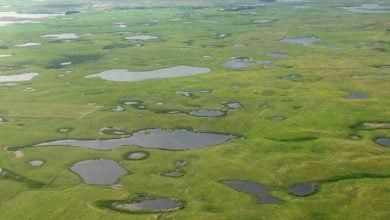A mysterious, oily substance appears in the river that runs through your community. Suddenly, fish and birds are dying. You think a toxic substance has been dumped or spilled into the river from a nearby factory.
|
“Wait a minute,” you say to yourself. “Soybean oil is safe. People and animals eat foods made from soybeans all the time. Why is it killing the fish and polluting the river?”
The deadly pollution is coming from factories that manufacture biofuels created from soybeans and other food crops.
“Ironic, isn’t it?” said Barbara Lynch, who supervises environmental compliance inspectors for the Iowa Department of Natural Resources. “This is big business. There’s a lot of money involved.”
Iowa has the most biofuel plants in the United States, with 42 ethanol and biodiesel refineries in existence and 18 more plants being built, according to the Renewable Fuels Association. In 2006, a plant in Iowa Falls dumped 135,000 gallons of liquid oil and grease, killing hundreds of fish.
The National Biodiesel Board asserts that biodiesel is non-toxic, biodegradable and safe for the environment. But scientists are not so certain.
“They’re really considered nontoxic, as you would expect,” said Bruce P. Hollebone, a researcher with Environment Canada in Ottawa and an expert on vegetable oil and glycerin spills.
“You can eat the stuff, after all,” said Hollebone. “But as with most organic materials, oil and glycerin deplete the oxygen content of water very quickly, and that will suffocate fish and other organisms. And for birds, a vegetable oil spill is just as deadly as a crude oil spill.”
Glycerin is a non-toxic byproduct of biodiesel production. It can be sold for other uses, but only after it undergoes an expensive cleaning process. Growing production of biofuels has flooded the market with cheap glycerin, and biodiesel manufacturers dump much of it since it would be hard to sell it for a profit after cleaning costs.
Workers at the Missouri Department of Natural Resources found out that biodiesel makers were dumping glycerin that had been contaminated with methanol, another hazardous waste product. The white, goopy substance was dumped into a channel, killing at least 25,000 fish and eliminating a population of an endangered shellfish, the fat pocketbook mussel.
In Alabama, the environmental group Black Warrior Riverkeeper heard about a fish kill in September 2006 that stretched 20 miles. People found oil in the water around the dead fish.
The Alabama Biodiesel Corporation, owner of a nearby biodiesel plant, was not charged in the case. In response, Black Warrior Riverkeeper filed a complaint in Federal District Court documenting at least 24 occasions when they found oil in the water near the plant. The company wants the complaint dismissed because it has an agreement with state officials to pay a $12,370 fine and to get proper discharge permits from now on.
Food for fuel gives food for thought
The problem of pollution coming from biofuel plants illustrates why capitalism is unable to solve the crisis of the environment.
The global warming crisis is caused by the untrammeled use of fossil fuels, which release carbon into the atmosphere. Biofuels, on the other hand, are made from renewable sources, which would seem to be safe for the environment. In that context, biofuels may look like a good idea on the surface.
However, there are a host of problems associated with biofuels within the context of capitalist production.
Using food crops for fuel has resulted in skyrocketing consumer prices for corn, milk and other food products. It has also been discovered that the process of growing crops for biofuels and producing biofuels themselves may actually release more carbon into the atmosphere than the production of fossil fuels.
On top of all that, now it turns out that biofuel waste products are hazardous to the environment when they are dumped into rivers instead of properly disposed. Whatever eco-friendly slogans biofuel producers may toss around, as long as dumping byproducts into rivers helps their bottom line, the practice will continue.
The common denominator between the climate change crisis and the problems with biofuels is that decisions about fuel and energy policy are based on what is most profitable, not on what is best for people, other animals and the environment in the long run. Socialism, a system based on centralized economic planning in which the profit motive has been removed, is the only economic system with the potential to create sustainable development for the future.







